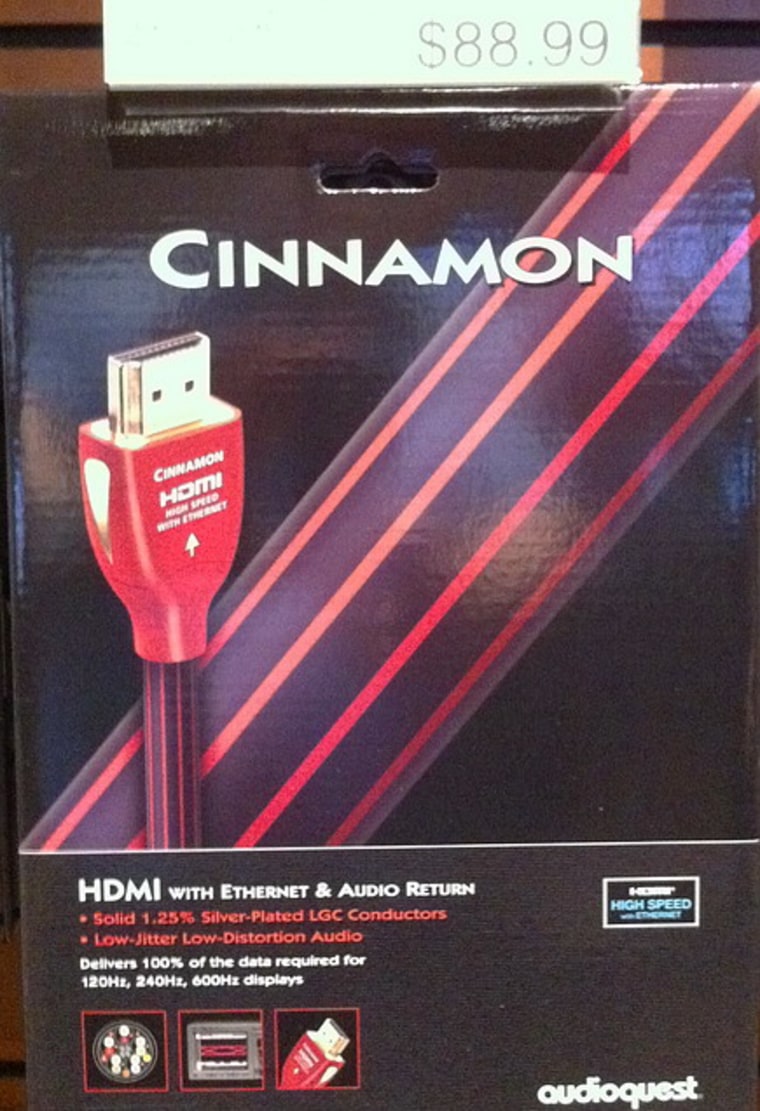Believe it or not, that $1,000 TV you're buying probably makes the store only a few dollars. The markup on TVs is very small. But that $100 HDMI cable the salesman sold you? That yields $90-plus in profit, easy.
In my former life I was an A/V salesman, but I'm feeling much better now. So I can offer an inside look at what's really going on.
Let's take a look at what the stores are pushing at the end of the sale, and if you really need it.
Extended Warranties
The perennial favorite. If you don't use them, they're 100 percent profit for the store. Think of them like any other insurance. For flat panel TVs, they're not generally worth it. Both plasma and LCD TVs are extremely reliable.
Related story: Extended warranties: Total rip-off or partial rip-off?
Cables
Sad to say, you're not going to get the cables you need in the TV box. You will need HDMI cables (or component, but HDMI is that little bit better, and a lot easier).
What you don't need is to spend a lot of money. There are only two states possible with an HDMI cable: it works, or it doesn't. If you see a picture, and it looks good, then you are getting the best picture possible. If you don't see a picture, or it's messed up with speckles, then the cable is defective and you should return it.
But $100 HDMI cables do not offer any additional performance over a $5 HDMI cable.
Let me say that again: the video and audio quality from one working HDMI cable is going to be the same as any other.
There are some specific exceptions. If you're planning on long cable runs (50 feet) then a better HDMI cable will be more likely to carry the signal without issue. Better doesn't always mean more expensive.
Technically, standard HDMI cables are rated to carry 1080i and “High-Speed” HDMI cables are needed for 1080p, but personally I've never had an issue. If you have equipment that takes advantage of HDMI with Ethernet, then that needs a specific cable, as the Ethernet is over a previously unused pin and may not be enabled on older HDMI cables. For 3D, High-Speed HDMI is recommended.
Related story: HDMI cable makers and dealers use misleading labels to push needless upgrades
So there's a 6-foot HDMI cable for $3. There's a 10-footer for $2. Remember, if they work, and they probably will, you are getting 100 percent picture and sound quality. Paying more for a cable doesn't increase picture our sound quality.
I also recommend monoprice.com. I've bought a bunch of cables there for next to nothing and they work great.
Power Conditioners
I'm kinda split on these. Many are nothing but snake oil. Promises of better black levels, better picture quality and so on are theoretically possible, but only if you have the worst power in the country. If the power in your home fluctuates to enough that you occasionally joke about living in the Third World, then OK, maybe a power conditioner can help. The catch is that every electronics product has a power supply built in that is designed to regulate the power … doing exactly what the power conditioner claims to do. Now, can it do a crappy job? Can it be overwhelmed? Sure. But not to the extent that the makers of some of these products would lead you to believe.
I look forward to your e-mails.
Some power conditioners have a built-in battery backup, so if you lose power you have time to power down your equipment. If you have a front or rear projection TV, these are great. A hard power off, with no fan-assisted cool-down, like what you would get during a power outage, can seriously reduce the lifespan of your equipment.
Related story: Will a line conditioner improve your image?
Occasionally you'll find a power conditioner/surge protector that claims to be rated to trip before lightning can damage your equipment. If they say it, I guess I'll believe it. But honestly, if you've got 1.21 jigawatts coursing through your house, I doubt a $9.99 plastic box is going to help.
So in the end, we'll cautiously recommend you put your A/V system on some sort of protection, though to what degree and what cost, that's up to you. Both Gary and I like APC products like this one as APC comes from a science/industrial background. We'll leave the snake oil stuff to other companies.
Others
Things such as delivery and setup are up to you. Setting up a TV isn't difficult, and if you get one of the setup Blu-rays I reviewed, it's even easier.
ISF Calibration, which may be recommended by some higher-end stores, is often worth it. Many TVs come from the factory with a color temperature reasonably close to the D6500 standard. If you're spending several thousand on your TV, it's worth it to hire a professional to calibrate it to its ultimate performance.
Related story: Must-have Blu-ray set-up discs reviewed
If you've been pressured to buy something at the point of sale that I didn't cover here, please post it in the comments or e-mail HD Guru, and I'll give you my two cents.
(Note: Amazon prices may change; please keep checking our links. Amazon free returns, price protection and bundles apply only to Amazon direct sales not to affiliated vendors.)
Have a question for the HD Guru? !
